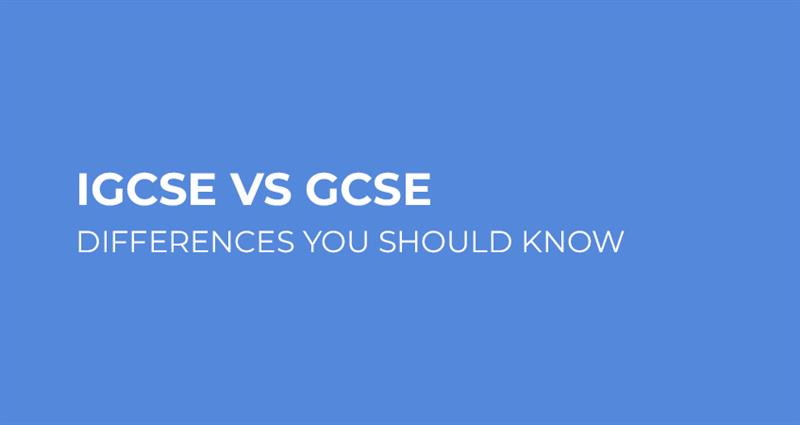
IGCSE vs GCSE
Share
Choosing the right qualification for your educational journey can feel overwhelming. Both IGCSE and GCSE are respected qualifications, but they have significant differences that could affect your future study and career plans.
IGCSE stands for International General Certificate of Secondary Education, while GCSE means General Certificate of Secondary Education. Both are secondary school qualifications typically taken by students aged 14-16. The main difference is that IGCSE was designed for international students, while GCSE was created for students in England, Wales, and Northern Ireland.
This guide will help you understand the five key differences between IGCSE vs GCSE. Whether you're a student, parent, or educator, knowing these differences will help you make the best choice for your situation. Exam Centre Birmingham has supported thousands of students through both qualifications, and we'll share our expertise to make this decision easier for you.
What is IGCSE?

IGCSE (International General Certificate of Secondary Education) is a globally recognised qualification developed by Cambridge Assessment International Education and Pearson Edexcel. Created in the 1980s, it was designed to provide high-quality international education that prepares students for further study anywhere in the world.
The IGCSE curriculum focuses on developing critical thinking, problem-solving skills, and creative expression. Students typically study 5-10 subjects, with core subjects including IGCSE English, IGCSE Maths, and IGCSE Sciences. The curriculum is flexible, allowing schools to choose subjects that best suit their students' needs and local context.
Universities and employers worldwide accept IGCSE qualifications. They provide excellent preparation for A Levels, International Baccalaureate, and other pre-university programmes. Many international schools, private schools, and some state schools in the UK offer IGCSE programmes.
What is GCSE?

GCSE (General Certificate of Secondary Education) is the standard qualification for students in England, Wales, and Northern Ireland. Introduced in 1988, GCSEs replaced the previous O Level and CSE qualifications. They are regulated by Ofqual in England, Qualifications Wales, and CCEA in Northern Ireland.
The GCSE curriculum covers a broad range of subjects, with English Language, English Literature, Mathematics, and Sciences being compulsory in most schools. Students typically study 8-12 subjects, depending on their school and ability level. The curriculum emphasises both knowledge acquisition and skill development.
GCSEs are the foundation for further education in the UK. They are required for entry to A Level courses, vocational qualifications, and apprenticeships. Universities and employers throughout the UK recognise GCSEs as proof of secondary education achievement.
5 key differences between IGCSE and GCSE

Difference 1: Curriculum and content
The IGCSE curriculum tends to be broader and more internationally focused. It often includes more essay-based assessments and encourages analytical thinking. Many subjects have different content from their GCSE equivalents.
For example, IGCSE English Literature may include texts from various countries and cultures, whilst GCSE English Literature focuses more on British and English-speaking authors. IGCSE History might cover global conflicts and international relations, while GCSE History often emphasises British history.
GCSE subjects follow the National Curriculum for England and Wales. The content is standardised across all exam boards, though there may be slight variations in how topics are presented. The curriculum includes specific British context and examples that relate to UK students' experiences.
Difference 2: Assessment methods
IGCSE assessments rely heavily on final examinations, typically with 100% exam-based assessment for most subjects. Some subjects include coursework, but the percentage is usually lower than in GCSEs. This approach tests students' ability to perform under exam conditions and recall knowledge effectively.
GCSE assessments combine examinations with controlled assessments and coursework. The balance varies by subject, but many subjects include 20-40% coursework or controlled assessment. This approach allows students to demonstrate their skills in different ways and reduces pressure on final exam performance.
IGCSE exams often have more essay questions and extended writing tasks. Students need strong analytical and writing skills to succeed. GCSE exams include a mix of question types, including multiple choice, short answers, and extended responses.
Difference 3: Grading system
IGCSE uses an A*-G grading system, similar to the old GCSE grading. A* is the highest grade, followed by A, B, C, D, E, F, and G. Grade C is generally considered a good pass, whilst grades D-G are considered lower passes.
GCSE switched to a 9-1 grading system in 2017. Grade 9 is the highest grade (equivalent to A*), grade 4 is considered a standard pass (equivalent to grade C), and grade 7 is equivalent to grade A. This new system allows for better differentiation at the top end.
The grade boundaries may differ between IGCSE and GCSE due to different marking schemes and question styles. Some students find IGCSE grading more predictable, while others prefer the GCSE system's finer distinctions at higher grades.
Difference 4: Subject choices
IGCSE offers a wide range of subjects, including some that aren't available at GCSE level. These might include Global Perspectives, World Literature, or Environmental Management. The flexibility allows students to pursue interests that align with international career paths.
GCSE subjects are more standardised, with core subjects being compulsory in most schools. The range includes traditional academic subjects plus vocational options. Recent changes have made some subjects more rigorous and removed coursework from many subjects.
Students taking IGCSEs often have more choice in how many subjects to study. Some take as few as five subjects, allowing for deeper focus. GCSE syllabus students typically take 8-10 subjects, providing broader coverage but potentially less depth in each area.
Difference 5: International recognition
IGCSE qualifications are designed for international recognition and are accepted by universities worldwide. They meet entry requirements for universities in the UK, USA, Canada, Australia, and many other countries. This makes them ideal for internationally mobile families.
GCSE qualifications are primarily recognised in the UK, though they are accepted by many international institutions. However, students planning to study abroad may need additional qualifications or may find IGCSE provides better preparation for international curricula.
For students planning to study outside the UK, IGCSE may provide better preparation for international university entrance exams like SATs or International Baccalaureate programmes.
Making the right choice for your future
Understanding the differences between IGCSE vs GCSE helps you make an informed decision about your education path. Both qualifications provide excellent foundations for further study and future careers. The choice depends on your individual circumstances, career goals, and study preferences.
Consider factors like your future study plans, whether you might move internationally, your learning style, and the subjects that interest you most. Remember that both qualifications are respected and will open doors to further education and employment opportunities.
Ready to take your next step?
At Exam Centre Birmingham, we support students taking both IGCSE and GCSE examinations. Our experienced team understands the requirements of both qualifications and can provide expert guidance on exam preparation and subject choices. We offer examination services for private candidates and work with schools to provide additional exam support.
Contact Exam Centre Birmingham today to discuss your IGCSE or GCSE options. Our friendly team can help you understand the requirements, book your examinations, and provide the support you need to achieve your educational goals. Send and email or call us to explore how we can help you succeed in your chosen qualifications.
Frequently asked questions
Which is harder, IGCSE or GCSE?
Both qualifications are challenging in different ways. IGCSE tends to have more exam-based assessment and may require stronger independent study skills. GCSE includes more coursework but covers more subjects. The difficulty often depends on the student's strengths and learning style.
Can I mix IGCSE and GCSE subjects?
Yes, many students take a combination of IGCSE and GCSE subjects. This is common in international schools and some UK schools. Universities and employers accept this combination, but check specific entry requirements for your chosen courses.
Do universities prefer IGCSE or GCSE?
UK universities accept both qualifications equally for admission purposes. The choice between IGCSE vs GCSE shouldn't affect your university prospects, as long as you meet the specific grade requirements for your chosen course.
Which qualification is better for international students?
IGCSE is often better suited for international students, as it's designed with global perspectives and international recognition in mind. However, students planning to study only in the UK might find GCSE more appropriate for their needs.
Can I take IGCSE exams as a private candidate?
Yes, many exam centres accept private candidates for IGCSE examinations. This is useful for homeschooled students or those wanting to retake specific subjects. Exam Centre Birmingham accepts private candidates for both IGCSE and GCSE examinations.
